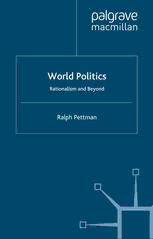
World Politics: Rationalism and Beyond PDF
Preview World Politics: Rationalism and Beyond
World Politics Also by Ralph Pettman BIOPOLITICS AND INTERNATIONAL VALUES COMMONSENSE CONSTRUCTIVISM, or the Making of World Affairs HUMAN BEHAVIOUR AND WORLD POLITICS: A Transdisciplinary Introduction INTERNATIONAL POLITICS: Balance of Power, Balance of Productivity, Balance of Ideologies MORAL CLAIMS IN WORLD AFFAIRS (editor) RETHINKING GLOBAL AFFAIRS (editor) SMALL POWER POLITICS AND INTERNATIONAL RELATIONS IN SOUTHEAST ASIA STATE AND CLASS: A Sociology of International Affairs UNDERSTANDING POLITICAL ECONOMY, with Readings for the Fatigued World Politics Rationalism and Beyond Ralph Pettman Professor of International Relations Victoria University of Wellington New Zealand © Ralph Pettman 2001 All rights reserved.No reproduction,copy or transmission of this publication may be made without written permission. No paragraph of this publication may be reproduced,copied or transmitted save with written permission or in accordance with the provisions of the Copyright,Designs and Patents Act 1988, or under the terms of any licence permitting limited copying issued by the Copyright Licensing Agency,90 Tottenham Court Road,London W1P 0LP. Any person who does any unauthorised act in relation to this publication may be liable to criminal prosecution and civil claims for damages. The author has asserted his right to be identified as the author of this work in accordance with the Copyright,Designs and Patents Act 1988. First published 2001 by PALGRAVE Houndmills,Basingstoke,Hampshire RG21 6XS and 175 Fifth Avenue,New York,N.Y.10010 Companies and representatives throughout the world PALGRAVEis the new global academic imprint of St.Martin’s Press LLC Scholarly and Reference Division and Palgrave Publishers Ltd (formerly Macmillan Press Ltd). ISBN 978-1-349-42208-1 ISBN 978-0-230-28672-6 (eBook) DOI 10.1057/9780230286726 This book is printed on paper suitable for recycling and made from fully managed and sustained forest sources. A catalogue record for this book is available from the British Library. Library of Congress Cataloging-in-Publication Data Pettman,Ralph. World politics :rationalism and beyond / Ralph Pettman. p.cm. Includes bibliographical references and index. 1.International relations—Philosophy.2.International relations– –Methodology.3.International relations—Study and teaching.I.Title. JZ1242 .P48 2000 327.1'01—dc21 00–033298 10 9 8 7 6 5 4 3 2 1 10 09 08 07 06 05 04 03 02 01 Contents Preface vii Introduction 1 Part 1 World Affairs in Perspective Introduction to Part I 23 1 The Politico-Cultural Context 40 2 The Politico-Social Dimension 54 3 The Politico-Economic Dimension 65 4 The Politico-Strategic Dimension 73 Part 2 World Affairs Approached Introduction to Part II 79 5 The Modernist Project 83 6 Individualism, Nationalism, Collectivism 99 7 Liberalism, Mercantilism, Market Universalism and Marxism 108 8 Realism, Internationalism, Globalism 120 Part 3 Taking Part in World Affairs Introduction to Part III 131 9 Mind-making 132 10 Self-making 139 11 Market-making 143 12 State-making 147 Part 4 Conclusion 13 Conclusion 155 Notes 174 References 178 Index 182 v This page intentionally left blank Preface This book represents the conclusion of a protracted attempt to answer three very general questions, namely: what are ‘world affairs’, that we might know them; what are ‘we’, that we might know world affairs; and what, in this respect, is it ‘to know’? Here I address mostly the last concern, though in doing so, I am clearly addressing the others as well. In making the usual noises about those who have helped, I would like to thank Jim Rolfe in particular, since he has been such an impor- tant part of this project over the last few years. I should also add that the initial idea for this work was not mine. It was that of another esteemed colleague, Paul Morris. For good, ill, or otherwise, what follows wouldn’t have been written if he hadn’t sug- gested I do so. Thanks Paul, I think. And last but not least, there’s Setsuko. Thanks, my love. RALPHPETTMAN vii ‘although it might present a clouded surface to the eye of reason, one sensed a content … solid … consistent … explicit … new … original … on an equal footing with the ideas of the intellect’. MARCELPROUST Introduction For reasons that will soon become evident, ‘world politics’ is repre- sented here by the term ‘world affairs’. So, what is ‘world affairs’, whether in general terms or in the particular? What is our subject? Our subject is an object, or objects, since a question like this is most likely to be answered at the moment by putting the world at a mental distance and reifying it. World affairs studied in this objectifying fashion get notionally detached from us, becoming in the process such things as states and firms, nations and social movements. It is the mental distancing that comes first, particularly for the legatees of the so-called European Enlightenment. The thinkers of this place and time prioritized untrammelled reason. They exalted the objectifying mind-gaze. And every time we use reason the way they bid us do, we reaffirm the analytic distance they made into a major cultural project they have been pleased to entitle in retrospect the ‘modernist project’. And every time the result is reification. Objectivity is had by objec- tifying, which in turn tends to beget discrete analytic entities and outcomes, a sequence that is not inexorable, but one that is definitely a key feature of Euro-American thinking. This includes, of course, the Euro-American thinking that gets done about (and results in) one particular analytic ‘object’ – world affairs. It also behoves us to consider how it is that ‘abstractions … tend to emphasize the well-being of an aggregate rather than of individuals’, excepting, that is, the sort of abstraction that constitutes ‘individuals’ themselves (Poovey, 1998: 137). This has implications in turn for another key feature of Euro-American thinking – the concept of progress. Those born and raised as rationalists (‘rationalism’ being the use of reason as an end in itself) use detachment as a matter of course. It 1 R. Pettman, World Politics © Ralph Pettman 2001
